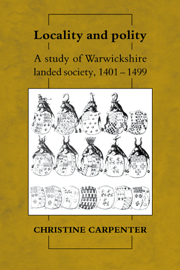Book contents
- Frontmatter
- Contents
- List of figures and tables
- Preface
- List of abbreviations
- Note on text
- 1 Introduction
- PART I STRUCTURAL
- 2 Geography, economy and regional identity
- 3 Who were the gentry?
- 4 Social mobility and the creation of estates
- 5 The exploitation of estates
- 6 Expenditure and dispersal
- 7 Conclusions: land, family and lineage
- 8 The local officers
- PART II CHRONOLOGICAL
- Appendices
- Bibliography
- Index
5 - The exploitation of estates
Published online by Cambridge University Press: 27 October 2009
- Frontmatter
- Contents
- List of figures and tables
- Preface
- List of abbreviations
- Note on text
- 1 Introduction
- PART I STRUCTURAL
- 2 Geography, economy and regional identity
- 3 Who were the gentry?
- 4 Social mobility and the creation of estates
- 5 The exploitation of estates
- 6 Expenditure and dispersal
- 7 Conclusions: land, family and lineage
- 8 The local officers
- PART II CHRONOLOGICAL
- Appendices
- Bibliography
- Index
Summary
Warwickshire farming in this period has already been definitively surveyed by Christopher Dyer. The object of this chapter is therefore less to give another overview of estate management than to add another dimension to our understanding of the gentry by asking what they expected to get out of their estates and how they expected to do it. Estate records survive in reasonable numbers for five families: Brome of Baddesley Clinton, Catesby (with some for William Bishopestone, part of whose estates the Catesbys inherited in the mid-1440s), Ferrers of Tamworth, Stafford of Grafton and Willoughby. There is also a certain amount of material for the Archers, Mountfords, Shirleys, Throgmortons and Verneys of Compton Murdack, and enough evidence for some other families – mainly deeds, but also those I.P.M.s which include extents, and some references from legal records – to be a useful supplement.
Agricultural conditions in the fifteenth century, it hardly needs saying, were not favourable to landlords. Grain prices were low, wages high, and in mid-century even the hitherto quite buoyant market for the products of animal husbandry slumped. Peasant tenants, the balance of demography now tipping decisively in their favour, were refusing to pay dues and staging rent strikes. On many great estates, including the lands of the see of Worcester, which were concentrated in the west midlands, income and rent levels reached their nadir in the middle of the century, just when the profits of animal husbandry, which had to some extent compensated for the failure of grain revenues, were declining. It is probably safe to assume that the greater lords were in a better position to cope with these difficulties than the gentry.
- Type
- Chapter
- Information
- Locality and PolityA Study of Warwickshire Landed Society, 1401–1499, pp. 153 - 195Publisher: Cambridge University PressPrint publication year: 1992



